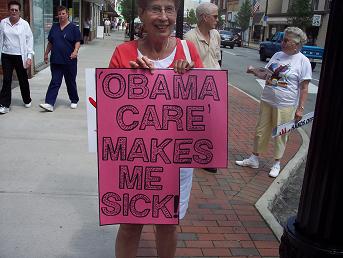The Christian Science Monitor takes a simple stab at this question here.
But here’s a key thing to remember: There is a simple concept at the center of this rambling, Rube Goldbergian machine. Democratic healthcare reform would expand insurance coverage in America by requiring people to obtain it.
That’s right. The healthcare reform bill would mandate that most US citizens and legal residents purchase “minimal essential coverage” for themselves and their dependents. They can get this either through their employer, or, if their employer doesn’t offer health insurance, they can buy it through new marketplaces that will sell policies to individuals.
Those marketplaces would be called “exchanges.” We’ll talk more about them in a later story. (We’ll also cover subsidies for health insurance, when it all would take effect, how it would be paid for, and what it means for businesses.)
I feel sure that the requirement to purchase health insurance will be challenged in court. Forcing a purchase with the penalty of fines seems to compel associations which could give rise to constitutional challenges. The forced purchases, however, are key to the provision which is attractive to most people: elimination of pre-existing conditions as a reason to refuse coverage.
Why is Congress doing this? It’s a pretty obvious way to expand coverage, for one thing. Also, it will help bring in a flood of new customers for health insurance firms, including healthy young people who might not need much healthcare.
For insurance firms, those new customers could balance out the losses they might incur if they can no longer deny coverage to people with preexisting conditions. (Yes, that’s another change the bill makes.)
And remember, many people will not be buying this coverage purely on their own. Uncle Sam will be helping them. The bookend to the individual mandate is federal subsidies for insurance purchases, which reach deep into the middle class. We’ll talk about those next.
In essence, you and I (via taxes) will be providing coverage for people who may not want it so that people who need coverage for serious conditions will have it. Insurers may still benefit by virtue of the millions of new subscribers. I suspect there will be severe fines for insurers who attempt to limit coverage or benefits. But I don’t know. And the lack of knowledge is what is politically troubling. There will be legislators who approve this bill over the weekend that have not read it.
According to the NY Times, key votes are still in play approaching a Sunday vote.


